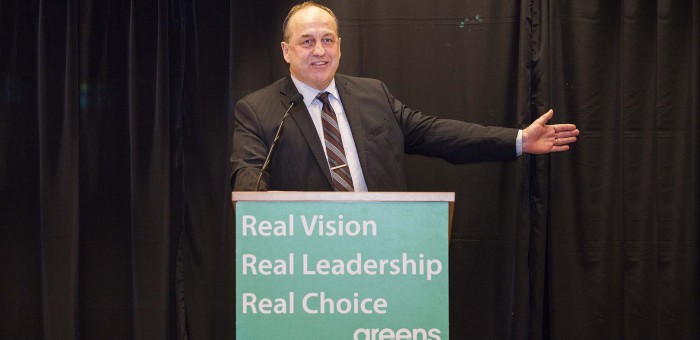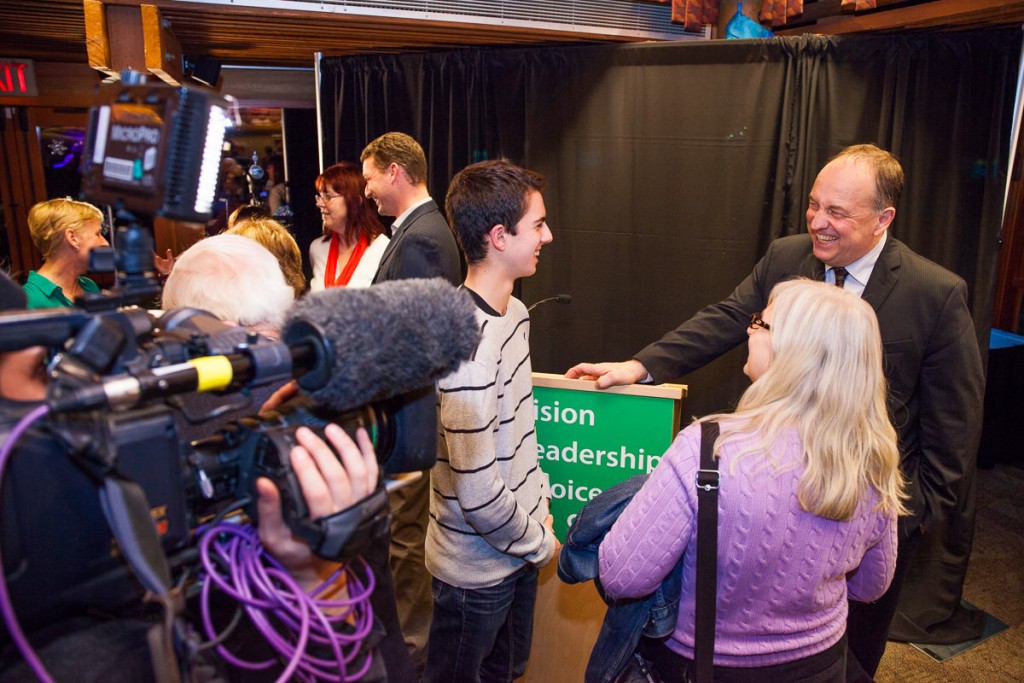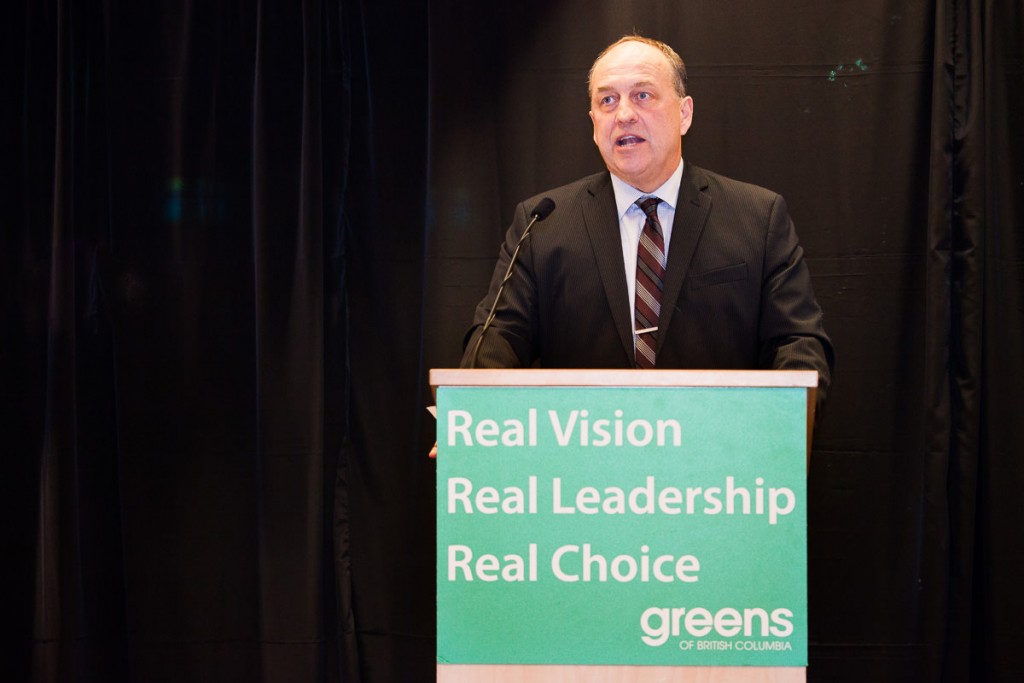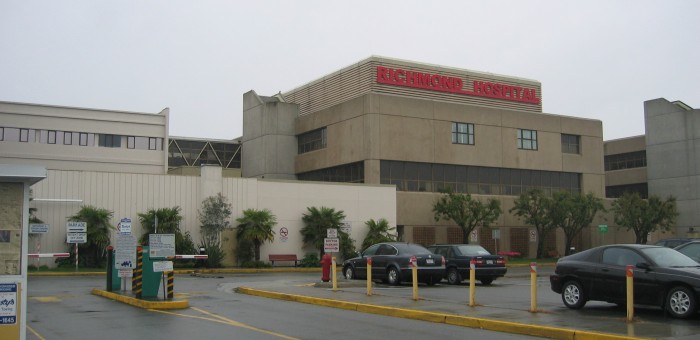Poverty and Homelessness
Leadership of the BC Green Party
At the UVic University Club on November 24, 2015 I formally announced my intention to seek the leadership of the BC Green Party. And on December 7, 2015 I was elected by acclamation as our new leader. Below is the text of the speech that I gave at the announcement. In the speech I outlined the reasons why I sought the leadership and I offered a vision for a prosperous future for all British Columbians.
Introduction
Thank you Elizabeth. You’ve been an absolute inspiration to me. And I am honoured that you were able to make it to tonight’s event knowing that you will be heading to the COP21 meeting in Paris imminently.
I’m also very grateful to Claire Martin for coming over from Vancouver to act as our MC. I know that she’s also off to COP21 shortly. And I am especially grateful to Butch Dick from the Songhees nation for welcoming us tonight.
Finally, this event tonight would never have happened if it weren’t for the efforts of the incredible group of individuals that I have the honour of working with: Judy Fainstein, Mat Wright, Evan Pivnick and Karin Lenger along with all of the volunteers. Thank you.
It’s humbling for me to see so many people here. I sincerely appreciate you all joining me this evening and I look forward to answering your questions and chatting with you one on one afterwards.
The University Club in which we stand has a special meaning to me. It first opened in 1967 in the old army hut that stands today as E-Hut. I remember as a little boy being taken by my parents to visit Santa at the annual Christmas parties, including the very first one they hosted. Over the years I’ve had many dinners and attended countless functions in the old E-Hut facility. And in 1982, when Phase II of the University Club was completed — the building we are in now — I had just started my final year of undergraduate studies.
I left Victoria in 1983 and it wasn’t until 1992 that Helen and I returned to our hometown. As a young faculty member I joined the newly created School of Earth and Ocean Sciences, appropriately located in E-Hut, the former location of the University Club. In 1992, if someone would have told me that I would be standing in the University Club as the elected BC Green Party MLA for Oak Bay Gordon Head, I would have thought they were crazy.
I was a scientist. I was a teacher and I had no interest in politics.
Yet two decades later, in the fall of 2012, Jane Sterk, after a number of previous attempts finally convinced me to run in the May 2013 provincial election.
I had spent many years understanding the basic physics of the past, present and future climate system. It became evident that global warming was emerging as the defining challenge of our time, and that there were enormous opportunities available to those jurisdictions that were first to act boldly in transitioning to a low carbon economy.
I advised governments at all levels on available policies that could allow them to seize those opportunities. And I saw British Columbia begin to show leadership by doing just that.
But as the government then shifted all of its efforts, and all of its hopes, to the LNG pipedream, I saw us lose that leadership. I watched as we went from leaders in developing a 21st century economy, to laggards, scurrying back to the 20th century, hoping for an out-dated and unrealistic LNG windfall. For three years now I’ve been saying the same thing. The economics simply does not work for BC to build a thriving LNG industry any time soon.
As I watched our provincial leadership unravel, I was reminded of something I would tell my students. If you want your government to show leadership on the issues that you care about, I would tell them that you need to elect people who will act on your concerns. Or, if you feel like none of the candidates is seriously addressing the issues you are worried about, you should consider running for office yourself.
Ultimately, I decided that I needed to take my own advice. I ran for office because I saw an opportunity to help build a vision that would put our province on a path of developing a 21st century diverse and sustainable economy. Now, after 2 1/2 years in office, it’s clear to me that this is more important than ever.
In the shadows of the massive challenges that we face, our province needs new leadership.
Leadership that offers a realistic and achievable vision grounded in hope and real change.
Leadership that places the interests of the people of British Columbia — not vested union or corporate interests— first and foremost in decision-making. And it’s not only today’s British Columbians that we must think about, it’s also the next generation who are not part of today’s decision-making process.
Leadership that will build our economy on the unique competitive advantages British Columbia possesses, not chase the economy of yesteryear by mirroring the failed strategies of struggling economies.
Leadership that will act boldly and deliberately to transition us to 21st century economy that is diversified and sustainable.
Leadership that doesn’t wait for public opinion — but rather builds it.
It’s clearer to me now than ever before. The province needs new leadership bringing new ideas, new direction and new people to the legislature. For too many decades British Columbia has had to put up with our two-party dichotomy of dysfunction.
On the left there’s the BC NDP. Frankly there’s nothing new or anything particularly democratic about the BC NDP. On the right we have the BC Liberals. And there is absolutely nothing liberal about the BC Liberals.
Too often British Columbians vote for the BC Liberals not because they like what they stand for, but rather because they dislike what the BC NDP stand for. Too often British Columbians vote for the BC NDP not because they like what they stand for, but rather because they dislike what the BC Liberals stand for. And therein lies our opportunity.
The BC Greens will offer British Columbians candidates, ideas and policy that they can vote for, instead of vote against. It’s time for us to create a third viable option.
And so, with the knowledge of the opportunities and challenges that lie ahead, I announce my candidacy for the Leadership of the BC Green Party.
To an Economic Vision for the 21st Century
We have a unique opportunity in British Columbia to be at the cutting edge in the development of a 21st century economy.
Our high quality of life and beautiful natural environment attract some of the best and brightest from around the globe —we are a destination of choice. Our high school students are consistently top ranked — with the OECD specifying BC as one of the smartest academic jurisdictions in the world. And we have incredible potential to a create clean, renewable energy sector to sustain our growing economy. When we speak about developing a 21st century economy — one that is innovative, resilient, diverse, and sustainable — these are unique strengths we should be leveraging.
Unfortunately, instead of investing in a 21st Century economy, our government has banked all its hopes on an irresponsible, unrealistic fossil fuel windfall, with its Liquefied Natural Gas sector. We are already seeing these promises unravel as we chase a falling stock, doubling down on the way.
A 21st century economy is sustainable — environmentally, socially and financially. We should be investing in up-and-coming sectors like the clean tech sector, and creative economy that create well-paying, stable long-term, local jobs and that grow our economy without sacrificing our environment.
We should be using our strategic advantage as a destination of choice to attract industry to BC in highly mobile sectors that have difficulty retaining employees in a competitive marketplace. We should be using our boundless renewable energy resources to attract industry that wants to brand itself as sustainable over its entire business cycle, just like Washington and Oregon have done. We should be setting up seed funding mechanisms to allow the BC-based creative economy sector to leverage venture capital from other jurisdictions to our province. Too often the only leveraging that is done is the shutting down of BC-based offices and opening of offices in the Silicon Valley.
We should fundamentally change the mandate of BC Hydro. BC Hydro should no longer be the builder of new power capacity. Rather, it should be the broker of power deals, transmitter of electricity, and leveller of power load through improving British Columbia power storage capacity. Let industry risk their capital, not taxpayer capital, and let the market respond to demands of cheap power.
Similarly, by steadily increasing emissions pricing, we can send a signal to the market that incentivises innovation and the transition to a low carbon economy. The funding could be transferred to municipalities across the province so that they might have the resources to deal with their aging infrastructure and growing transportation barriers.
By investing in the replacement of aging infrastructure in communities throughout the province we stimulate local economies and create jobs. By moving to this polluter-pays model of revenue generation for municipalities, we reduce the burden on regressive property taxes. Done right, this model would lead to municipalities actually reducing property taxes, thereby benefitting home owners, fixed-income seniors, landlords and their tenants.
Yes, we should be investing in trade skills, as described, for example, under the B.C. jobs plan. But we should also be investing further in education for 21st century industries like biotech, high tech and clean tech. It’s critical that we bring the typically urban-based tech and rural-based resource sectors together. Innovation in technology will lead to more efficient and clever ways of operating in the mining and forestry industries. Just last week, for instance, I was told the story of a BC-based technology innovator partnering with a local mine to dramatically improve the efficiency and environmental footprint of their mining operations. Rather than hauling thousands of unnecessary tonnes of rock to a crusher for processing, the new technology allowed the rocks to be scanned for gold content on site. This meant that prior to trucking, the company could determine if it was more cost-effective to simply put the rock to one side for use as fill later.
Natural gas has an important role to play. But, we should use it to build our domestic market and explore options around using it to power local transport. BC businesses such as Westport Innovations and Vedder Transport have already positioned British Columbia as an innovative global leader in this area.
We should be investing in innovation in the aquaculture industry, like the land-based technologies used by the Namgis First Nation on Vancouver Island who raise Atlantic salmon without compromising wild stocks.
The logging industry is booming yet we send record amounts of unprocessed logs overseas. Now is the time to retool mills to foster a value-added second growth forestry industry.
These are just a few ideas that could help us move to the cutting edge in 21st the century economy.
Fundamental to all of these ideas is the need to ensure that economic opportunities are done in partnership with First Nations. And that means working with First Nations through all stages of resource project development – from conception to completion.
To the issue of Affordability
A 21st century economy must also be an affordable one.
Right now, over half a million British Columbians are currently living in poverty. Today’s report issued by the BC Child and Youth Advocacy coalition noted that one in five children overall in BC live in poverty. More than 50% of children in single-parent families live in poverty. This is unacceptable.
The government responds to these facts with the same old mantra: It can’t do more until the economy grows. Yet, we hear year after year from the government that the economy is growing. The fact is, we have seen growth, we have money to invest, and we know that if we invest capital smartly we will actually save in operating costs. So let me offer just one or two ideas of where we should start:
Let’s fix the Registered Disability Savings Plans and Registered Educational Savings Plans. Currently, RDSPs and RESPs do not receive the same protection that RRSPs and RRIFs do when a family or individual is faced with bankruptcy. This means that when faced with bankruptcy, these already vulnerable individuals lose the one thing that would otherwise provide a glimmer of hope for a financially stable future. By simply providing creditor protection for disabled individuals and children’s education funds we can make the pathway out of poverty that much easier for those individuals experiencing bankruptcy. And let me be clear: This is a policy change—it doesn’t cost anything.
At the same time we know from other jurisdictions, that by providing chronically homeless individuals with a home through Housing First Policies, we not only provide individuals with a basic human right — shelter — but also better health outcomes, all while realizing long-term, overall net savings to government.
Medicine Hat saw a 26% decrease in emergency shelter use in just four years and has housed over 800 people, including over 200 children. Utah has reduced chronic homelessness by 72% as of 2014. A housing first pilot project in Denver, Colorado found emergency related costs and incarceration costs declined by 72.95% and 76% respectively, while emergency shelter costs were reduced by an average of $13,600 per person. Canada’s own At Home/Chez Soi study found that for every $10 invested in housing first services there was an average savings of $21.72.
And we need to deal with rampant speculation in our housing market. Simple steps like closing the Bare Trust Loophole would be effective. Or, as I introduced in a private members bill earlier this year, providing government the means of determining who is purchasing property in B.C. This includes determining both foreign investment flows, the role that corporations are playing in purchasing property and if we have significant speculation coming from other places in Canada.
The solutions to our province’s affordability crisis are out there, and those solutions themselves are affordable. We just need to invest in them. Given everything we know, the question becomes this: how can we afford not to?
To the issue of Health Care
The need for affordability must extend to quality health care too.
We can be proud that B.C. was recently ranked the healthiest province in Canada. This ranking shines a positive light on the healthy lifestyle choices British Columbians make each day. Yet, while we celebrate our successes, we must also remember that our health care system faces serious challenges.
With a highly regressive health care funding system, an aging population, major gaps in primary care, and surgery waitlists lasting anywhere from months to years, it is time for government to take a serious look at how our Health Care System is funded and administered.
British Columbia is the only province in Canada that continues to charge MSP premiums. Such premiums unfairly burden low and fixed income British Columbians with an overly heavy tax burden. With individuals earning a net annual income of $30,000 paying the same monthly flat fee as those earning $3,000,000 per year, it is evident that MSP premiums are perhaps the most regressive form of taxation in B.C.
Instead of charging MSP premiums, we should look at shifting to alternative, more progressive options such as was done in Ontario and Quebec. Rather than flat-rate fees, health premiums can be paid through the personal income tax systems. This avoids the regressive effects of flat-rate premiums and diminishes the additional costs associated with administering the MSP program.
But it can’t stop there. We also need to address the growing gaps in primary care. Doctor shortages and long wait times to get an appointment have led to increased use of walk-in clinics and emergency room services. Unfortunately, this can be costly for both patients and our health system, as a lack of follow-up and co-ordination can mean problems are missed or poorly managed.
Let’s look at investing more in Nurse Practitioners to help close some of these gaps and provide the high quality and timely care that British Columbians pay for and need. Let’s find more effective ways of funding these Nurse Practitioners. Let’s re-examine our approach to the delivery of chronic care services. Relying on acute care services, such as walk-in clinics and hospital emergency rooms, to deal with chronic health issues is both costly and inefficient.
Let’s consider increasing community and at-home care programs, which have been shown to provide better care at a more affordable cost. And let’s lobby the Federal government for our fair share of Canadian Health Transfer revenue, a share that reflects our demographics and the actual cost of delivering health services.
The possibilities for improving our health care system are plenty. As our population continues to age and gaps in primary health care continue to grow, it is more important now than ever to commit to re-examining how we provide affordable, quality health care in B.C.
To the issue of Education
Public education represents perhaps the most important investment government can make for the prosperity of our province. Each and every one of us has attended school and that experience has shaped who we are, what we do and how we contribute to society. And public education is absolutely critical in teaching the next generation of British Columbians to think critically, contribute responsibly to society, and become the leaders of tomorrow.
Given this, why have we not shown more leadership in the Education sector?
At the end of the strike last year, the government spoke about “an historic six-year agreement…which means five years of labour peace ahead of us.”
The implication of this sound bite is NOT that government is stepping up to the task of finding new ways to fund and deliver a leading public education system. The reality is that they are stepping back, allowing their dysfunctional relationship with teachers to simmer, only to boil over again in a few years.
We are stepping back despite an overall 18% and a whopping 44% aboriginal six-year high school non-completion rate. We have school boards at a loss for how to fund their operations due to seemingly endless budget cuts. Surely this is not indicative of a government properly valuing publication education.
It is time for the government to take leadership.
Leadership means ensuring that the resources needed for success are provided. Over the last 13 years, education funding as a percentage of provincial GDP has declined from a high of about 6.4% to an estimated low of about 5.0%. This is not indicative of a government that is prioritizing education. We need to find new, progressive funding sources to reinvest in education.
Leadership means acknowledging that behind the curtain of the BC Public School Employers’ Association is the provincial government. Yet it is the government, not BCPSEA, that draws the lines in the sand on funding. By dismantling the BCSPEA and bringing its operations back into government, a signal could be sent that government is serious in developing a new relationship with teachers.
Leadership also requires a clear eyed assessment of what’s working, and what isn’t – and clearly a ‘one size fits all’ approach isn’t working. The needs on Haida Gwaii, are different from those on Vancouver Island which in turn are different from those in Surrey or Prince George. Now is the time to explore whether or not class size and composition negotiations are better conducted at the school district level instead of the provincial level.
The status quo on education isn’t addressing the growing challenges. We cannot wait until the next labour dispute. Now is the time to sit down with stakeholders and start a dialogue about what a 21st century education system looks like, including how it is funded.
To the issue of Leadership
Our present provincial political leaders seem to have forgotten the essential traits of a successful leader: being principled, honest, authentic, trustworthy and having integrity. Our political leaders must have the courage to be honest with British Columbians about the risks and consequences of any government decision. Honest about the consequences of reckless hyperbole of government promises.
Perhaps the most striking illustration of the lack of honesty in BC’s political discourse has to do with LNG. In the lead-up to the last election, British Columbians were sold a bill of goods by this government. The promise of 100,000 jobs, a $100 billion prosperity fund, a $1 trillion hit to GDP, a debt-free B.C. and on and on.
This government has spent the last three years touting B.C.’s imminent LNG industrial boom. They sent a signal to the market that if industry wanted to do business in B.C., it had better have something to do with LNG. Yet BC’s venture into LNG has been a monumental failure.
The undeniable truth is that British Columbians were sold a bill of goods in that last election that will not come to pass.
Unfortunately it is British Columbians who will bear the consequences of the BC Liberal decisions.
The government’s all in approach on LNG has seen us lose our place of leadership in developing a 21st century economy.
But it’s not too late to reverse this. What we need is a renewed commitment to evidence-based decision making, and a government that is honest with its citizens.
Leadership builds public opinion – it doesn’t follow it. We need politicians who put the good of the province ahead of the good of the party.
This is the type of leadership that is absent from both the BC LIberals and the BC NDP. The BC Liberals will tell you whatever it takes to win. The BC NDP take positions based on what the BC Liberals do, rather than on what the evidence tells us. They try to be all thinks to all people and hence are paralysed by the decision-making process.
One only needs to sit in the legislature for a single debate to see that positions are taken based on the politics of an issue, rather than the evidence behind it.
British Columbians expect more than this. They want to see government acting to help all British Columbians – not merely those who voted – or funded them. This means an honest and open commitment to seek out perspectives and ideas of others and evaluate them based on their merit. Not their source.
To the issue of Choice
There is a choice that we will face in 2017. Another four years of the same old, same old politics as usual that has been working for far too long against the interests of British Columbians, or a new approach to politics that will focus on putting the interests of British Columbians first.
The BC Green Party is the only party that will offer British Columbians a real choice and a real vision for the province. We will offer real leadership with new candidates who run to put British Columbians first and break down the dysfunctional cycle of partisan politics that has dominated British Columbia for far too long.
It will take all of us to bring this vision forward. We have a lot of hard work ahead of us.
But together we will build a prosperous future for all British Columbians.
Thank you everyone for coming tonight and I look forward to your support in the lead up to the 2017 provincial election.
CBC Radio Interview Shortly Before the Event
Affordability & Metro Vancouver’s Potential Housing Bubble
Today in the legislature I rose to question the Minister of Finance as to what steps, if any, government is taking to ensure that Metro Vancouver’s potential housing bubble doesn’t burst and that housing remains affordable in the region. I further inquired as to what plans the minister has to gather data to ensure that future decisions and policy development are informed. Earlier in the day I introduced a Private Members’ Bill that would provide government with a tool to begin measuring the impact that speculation is having on affordability in Metro Vancouver.
Below are the text and videos of my speech and the Minister’s response.
Question
A. Weaver: Earlier this year we learned that the U.S. short-sellers are betting on a Canadian housing crash, calling it an accident waiting to happen. One article quoted a high-profile U.S. short-seller who described the Vancouver housing market as “a mix of money laundering, low interest rates.” And he went on: “A house is something you live in, but in Vancouver you guys are trading them like penny stocks on Howe Street.”
Government often points to global forces as the main reason we need to be so careful and deliberate with our economic management. I’m left wondering: where is the careful and deliberate action to ensure that Metro Vancouver’s housing market doesn’t become the next housing bubble?
More and more British Columbians are taking on bigger and bigger mortgages as housing becomes less affordable. The economic consequences of a burst housing bubble would be profound.
My question to the Minister of Finance is this. Can he provide this House with an update as to what actions, if any, his government is taking to ensure that Vancouver’s housing bubble doesn’t burst?
Minister’s Response
Hon. M. de Jong: To the member, the first thing I can do, perhaps surprisingly, is validate for him the interest, the curiosity, at times the fascination, that Americans have for the Canadian real estate market, the Canadian housing market, and that includes certainly the Vancouver market. That comes up frequently in the discussions we have from them.
I think it derives in large measure from their own experience and the trauma that they suffered after 2008. I think, further to that, it derives from the belief that if it happened there, it is destined and, therefore, must happen elsewhere.
What I tell them is this. I’ll respond, and I’ll tell the member and the House what I say to them. You do have to understand that there are some fundamental differences. The levels of equity that are involved in home ownership in British Columbia are, on average, very, very different than American markets. The rate of default and arrears thus far is very small, and the general stability of our banking system is different.
Now, I don’t say that at all to diminish or dismiss the concern, but this has been a high-value real estate market for a long, long time. What the government is doing is examining measures that may encourage first-time homebuyers to enter the market. We are, as well, through B.C. Housing, working to gather more information and more data. And I’m alive to the private member’s bill that was tabled today. We are also seeking to work with local governments to address issues around density that are a key part of the puzzle of addressing housing affordability.
Supplementary Question
A. Weaver: Thanks to the minister for his response there.
We’ve also recently heard from the Chinese consul general in Vancouver, Ms. Liu Fei, who suggested that the blame for the situation lies with “officials who monitor buyers, sellers and real estate developers.” She goes on to say: “People are blaming the buyer. It’s the wrong direction. I mean, the regulation here, nobody’s playing the role.”
Her point is that government must ensure that housing remains affordable and the bubble does not burst. Now, the first step towards formulating good housing policy is to ensure that the necessary information is available for analysis. For example….
Madame Speaker: A question.
A. Weaver: A question, I have. It’s a key question. Is the bare trust property transfer tax loophole that I have bought up several times here….is it actually incentivizing the speculative market?
My question then to the minister is: instead of rhetorical speculation contained in the reports that government released earlier this year, will the Finance Minister provide British Columbians with an outline of what data it plans to collect and analyze to determine what action is necessary to ensure that people retain access to affordable housing in Metro Vancouver, what plans does the minister have…?
Madame Speaker: Question.
A. Weaver: What plans does the minister have to gain and gather data to ensure that decision and policy is informed?
Minister’s Response
To the member, I must first of all confess that officials representing the government of the People’s Republic of China may have an affinity for centralized control and management that I do not share. But be that as it may, I think there is value in gathering additional data, which is why I’m pleased the Minister Responsible for Housing, through B.C. Housing, is working with agencies to gather additional data.
I mentioned earlier some of the other steps that the government has taken — I do believe, matters relating to density. I can provide the member with data and statistics about the average price of housing in Vancouver, which is actually lower than many people think. You can still purchase a home in Vancouver for under $400,000. About 30 percent of the homes that are exchanged or sold are sold for less than that.
I think that a big part of this is driven by the general economic circumstances, and if….
Madame Speaker: Thank you, Minister.
Hon. M. de Jong: Madame Speaker, since I don’t expect I’m going to get a question from the official opposition about the state of the economy or the public accounts that were tabled, I will take this opportunity to advise the House what people are saying.
Madame Speaker: Thank you, Minister.
Hon. M. de Jong: The national bank says B.C.’s economy is relatively buoyant, the budget is balanced, and the debt burden is relatively low and falling.
Madame Speaker: Minister.
Hon. M. de Jong: Little wonder B.C. is leading the way in Canada.
Video of Questions and Responses
Bill M227 — Land Title Amendment Act, 2015
Today in the legislature I introduced a Private Member’s Bill. If enacted, the Bill, entitled Land Title Amendment Act, 2015 would amend the Land Title Act to reintroduce and expand provisions that were previously in the Act. Such provisions will help determine who is purchasing property in BC. It would allow the government to determine foreign investment flows, the role corporations are playing, and whether we are seeing speculation in our market coming from other regions of Canada.
Text of my Speech
A. Weaver: I’m pleased to be introducing a bill that offers government one of the tools it needs to begin to properly assess and act upon the affordability and housing crisis affecting Metro Vancouver and emerging here in the capital regional district.
There’s been significant conversation in the past few months about the role that speculation is playing in our market. The government came out with a number of documents purporting that foreign investment wasn’t a factor. These studies were vague and lacked any links to clear, rigorous evidence that supported the claim.
It’s with this in mind that I bring this bill forward today. The bill amends the Land Title Act to provide the government with the means of determining who is purchasing property in B.C. This includes determining both foreign investment flows, the role that corporations are playing in purchasing property and if we have significant speculation coming from other places in Canada.
To be clear, this bill is not about identifying what specifically is driving housing prices to unsustainable rates but, rather, to ensure that government is informing itself so that any future policy measures are based on a better understanding of what is happening with our provincial real estate industry.
Video of my Speech
Press Release on Introduction of Bill
Media Statement: July 16, 2015
MLA Weaver Introduces Bill to help inform solutions to Affordability Crisis in Vancouver
Victoria B.C. -Victoria B.C. – Today, Andrew Weaver, MLA for Oak Bay-Gordon Head and Deputy Leader of the B.C. Green Party, tabled his private members bill that provides government with a tool to begin measuring the impact that speculation is having on affordability in Metro Vancouver.
“This is not about stopping the flow of investment or preventing growth in the real estate sector,” said Andrew Weaver. “We need to take serious and deliberate steps to smooth the rate of increase in prices to ensure that the region can manage the growth in a sustainable manner.”
If enacted, this Bill would amend the Land Title Act to reintroduce and expand provisions that were previously in the Act, which can help determine who is purchasing property in BC. It would allow the government to determine foreign investment flows, the role corporations are playing, and whether we are seeing speculation coming from other regions of Canada.
“Smart public policy requires good information about what action is needed,” said Andrew Weaver. “I am concerned that this government isn’t taking seriously the challenge of affordability that many people are experiencing in the Metro Vancouver. Strong, resilient communities are worth protecting.”
-30-
Media Contact
Mat Wright – Press Secretary, Andrew Weaver MLA
Mat.Wright@leg.bc.ca
Cell: 1 250 216 3382
Select Standing Committee on Health Won’t Examine MSP Reform
Over the course of the last few months I have been working to raise awareness about the regressive approach British Columbia is taking to fund health care via flat-rate MSP premiums. I’ve been pressuring both the government and the official opposition to support a more progressive approach like that in place in Ontario.
I’ve written about this earlier and tabled a petition in the legislature of 6,662 British Columbians who agreed. Furthermore, during question period, I asked the Minister of Finance if the government would empower the Select Standing Committee on Health to examine innovative, progressive ways of revising how MSP premiums are charged. The Minister responded that he believed the mandate of the committee was sufficiently broad for “members of the committee, and those that they might invite in, to have the kind of conversation that the member is alluding to”.
Following up on the Minister’s response, I formally wrote to the Chair of the Select Standing Committee on April 17 asking two specific questions regarding the possibility of initiating a conversation with respect to the funding of MSP in British Columbia.
I received a response to my letter today.
The response was, to say the least, most disappointing. The Chair of the committee stated that “they consider only those matters that are referred to them by the Legislative Assembly”. Given the Minister’s response to my question during question period, this statement is most perplexing.
What’s even more troubling is that further in the letter, the Chair of the committee states:
“The Committee is currently working to identify potential strategies to ensure the sustainability and improvement of our health care system while ensuring its financial sustainability.”
Moving MSP premium funding from a regressive to a progressive system of funding is precisely one of the key ways we can ensure the financial sustainability of our healthcare system. I am astonished that the Committee has apparently not recognized this.
For those interested, the Select Standing Committee on Health has the following members:
Linda Larson Liberal, Boundary-Similkameen (Chair)
Judy Darcy NDP, New Westminster, (Deputy Chair)
Donna Barnett Liberal, Cariboo-Chilcotin
Dr. Doug Bing Liberal, Maple Ridge-Pitt Meadows
Sue Hammell NDP, Surrey-Green Timbers
Richard T. Lee Liberal, Burnaby North
Dr. Darryl Plecas Liberal, Abbotsford South
Jennifer Rice NDP, North Coast
Bill Routley NDP, Cowichan Valley
Dr. Moira Stilwell Liberal, Vancouver-Langara
Let’s Take Politics out of Minimum Wage Policy
Earlier today the BC government announced that they would be increasing the minimum wage by $0.20 and implementing a process to further increase it every September, based on increases to B.C.’s Consumer Price Index (CPI).
While I am sure we can all agree that minimum wage needs to increase and that tying it to the CPI is a good thing, in my view, this announcement is merely the latest iteration of a highly politicized process for determining increases to the minimum wage.
I think it’s time we changed the way minimum wage is determined. We need to get politics out of the process as much as possible. This isn’t wishful thinking – we only have to look at the steps Ontario is taking to develop a better way forward.
In June of 2013, the Ontario government struck a Minimum Wage Advisory Panel to examine Ontario’s minimum wage policy and provide advice on an approach for determining minimum wages in the future. The panel was made up of two business representatives, one organized labour representative, one non-union employee representative and one youth representative. They engaged in a wide sweeping consultation with Ontarians from all sectors of the economy. They held town halls in ten cities, and accepted submissions online, through mail and on their website.
This process culminated in the January 2014 release of the Minimum Wage Advisory Panel Report and Recommendations to the Minister of Labour.
This is a substantial document and I encourage anyone interested in this topic to give it a read. It is very thorough provides the reader with the research and debates surrounding minimum wage policy. It is not an ideological document, but rather willingly highlights controversial issues and the need for further study.
What is important to note right away is that the public feedback the panel received contained a “near universal agreement on making the process of revising minimum wages more transparent, predictable, fair and arms-length from government’s own near-term concerns.”
This was missing from today’s announcement about the B.C. increase — it was yet another political move that wasn’t actually addressing the full extent of the problem. Annual increases tied to inflation will only ensure minimum wage doesn’t fall further behind, rather than asking whether it still has some catching up to do before indexing minimum wage to the B.C. Consumer Price Index.
The Ontario Panel wasn’t tasked with determining if the minimum wage should go up, or what the baseline value should be, but rather to advise how a process could be developed that would address multiply stakeholders concerns. For business, predictability and gradual increases (as opposed to big increases all at once) are important; for labour and those employed at the minimum wage, it’s critical that a process be established that would protect them from falling behind while ensuring careful consideration was being taken to set a rate that improved quality of life.
The fact is, changes to the minimum wage can have wide spread, and not always obvious impacts on the economy. This report does an excellent job of canvassing the research on the economic impact of minimum wages on a variety of factors, including wage distribution, low-wage workers, education and poverty. Almost universally, the research available about the impacts of minimum wage increases is not overwhelmingly positive or overwhelmingly negative, but instead suggests the need for careful and considered policy, rather than using the minimum wage to accomplish political ends.
This is particularly true when it comes to using minimum wage policy to fight poverty. For this purpose, minimum wage is a very blunt tool.
For starters, the demographics of people earning minimum wage limits its effectiveness as a measure to fight against poverty. A large number of those earning minimum wage are in fact students, many who are still living at home with their parents. Furthermore, the report points out that many minimum wage jobs are often taken as stepping stones to higher paying jobs.
This is not to suggest that minimum wage policy has no role to play in fighting poverty. Rather minimum wage is just one of a suite of policies that could and should be advanced, including housing first, skills training and taxation reform, etc. As the panel noted:
“Any linkage between the minimum wage and poverty needs to be situated within the context of various other measures to address poverty…”
It is also important that we don’t limit the description of poverty to those earning the minimum wage. There is a large gap between the minimum wage in British Columbia and the living wage – that is the minimum wage needed to ensure you are meeting your basic needs. We need to ensure that we are providing the supports for people throughout this range of incomes.
The report from the Minimum Wage Advisory Panel concludes with 4 key recommendations:
Recommendation #1: Minimum wages should be revised annually by a percentage equal to the percent change in the Ontario Consumer Price Index.
Recommendation #2: Minimum wages should be revised annually, and a minimum four months’ notice of any wage change should be provided. The effective date of minimum wage changes should be April 1 of the following year. This would result in notification by December 1 of the previous year.
Recommendation #3: The Government should undertake a full review of the minimum wage rate and the revision process every five years. This review should be conducted by a panel of stakeholders and a neutral chair. The mandate of this Panel would be to review Ontario’s past experience with minimum wage revisions within the context of Ontario’s social and economic progress and prevailing practices in other jurisdictions to recommend changes that could better serve Ontario’s future needs.
Recommendation #4: To aid the full review process, and to ensure that Ontario’s minimum wage policies are in step with the needs of it’s citizens, the Government should establish an ongoing research program for data and information gathering its subsequent analysis to address policy-relevant minimum wage issues.
Some of these recommendations will look similar to today’s announcement in British Columbia – and indeed there are flashes of good policy in what the British Columbia government has proposed. Committing to an annual increase to the minimum wage tied to the British Columbia CPI is exactly what was recommended in Ontario. However the policy in British Columbia remains incomplete until we properly de-politicize it. That will take a commitment from the government to empower a properly independent panel to conduct the necessary consultations to determine what the appropriate minimum wage level is, and how future increases will be achieved and reviewed as time moves forward.
At the end of the day, my own view is that the minimum wage is certainly too low. However, I wouldn’t be able to point to a specific number that I believe is the “right” place for a minimum wage. We need an independent, non partisan British Columbia panel to conduct an exercise similar to what was done in Ontario, but expand its mandate to recommend a new minimum wage that puts the needs of British Columbians first.
Rather than pulling a number out of a hat, advancing clear, evidence-based policy on minimum wage that is arms-length from government would end the cycle of putting politics first, and instead start making working people the top priority.













